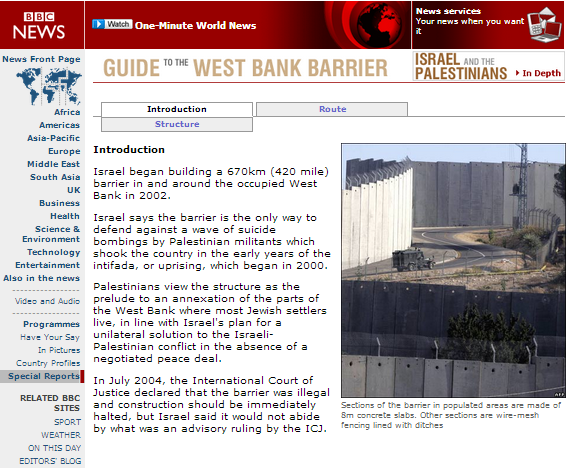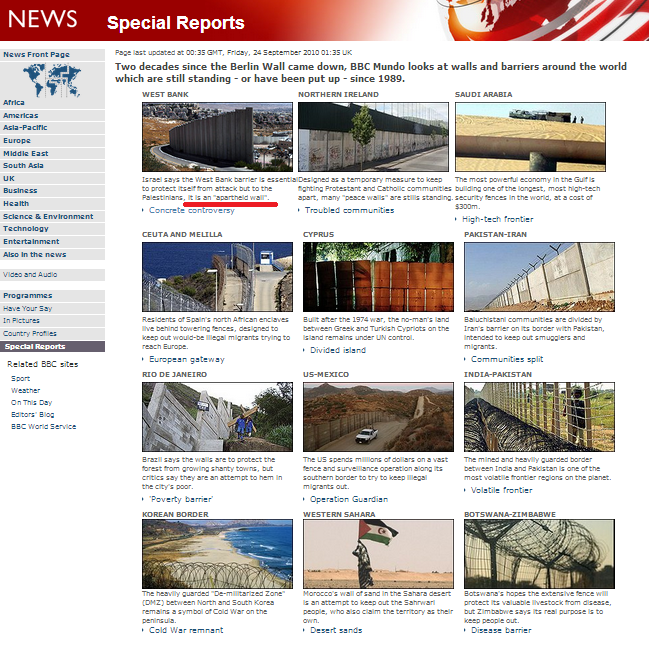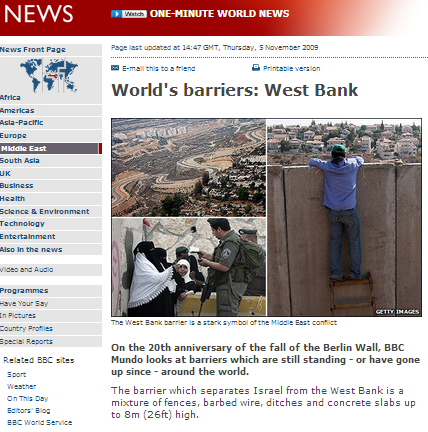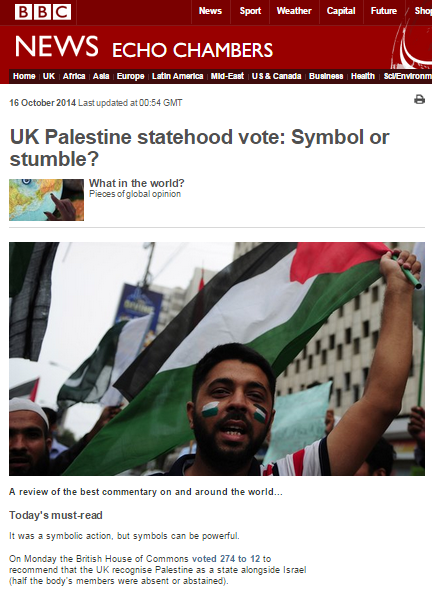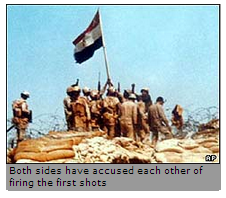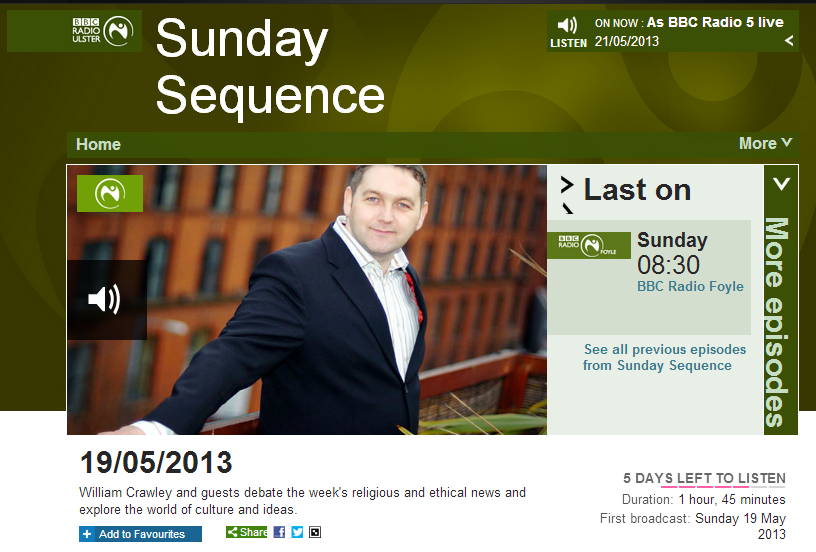In part one of this article we examined the level of adherence to BBC editorial guidelines on impartiality with regard to the images used to illustrate BBC News website content relating to Israel’s anti-terrorist fence. In part two we will look at the written aspects of content which can be described as specially created backgrounders rather than ongoing news reports.
In the category of backgrounders available to visitors to the BBC News website, we find an undated feature titled “Guide to the West Bank Barrier” which is part of a project headlined “Israel and the Palestinians In Depth”.
Despite this article being undated, we can conclude from its text that it was produced sometime after July 2004 – at least two years or more after the construction of the fence had begun in the Spring of 2002. By that time, statistics pertaining to the fence’s effectiveness in curbing terror attacks originating from Palestinian Authority controlled areas were available.
“A comparison of the number of attacks within Israel carried out by Samaria-based terrorists after the anti-terrorist fence was built, and the number of attacks carried out by the same terrorist groups before the building of the fence, reveals a drop of some 90 percent in the ability of these terrorist groups to perpetrate attacks within Israel.
In the 11 months between the erection of the first segment at the beginning of August 2003 and the end of June 2004, the Samaria-based terrorist groups have succeeded in carrying out only three atrocities within Israel. All three occurred in the first half of 2003, during which 26 Israelis were murdered and 76 wounded. (In two of the cases, the terrorists infiltrated via areas in Samaria where the fence was not yet completed. In the third, a female terrorist entered through the Barta’a crossing using a Jordanian passport.)
In contrast, during the 34 months from the beginning of the violence in September 2000 until the construction of the first continuous segment of the anti-terrorist fence at the end of July 2003, between Salem and Elkana in Samaria, Samaria-based terrorists carried out 73 atrocities (suicide bombings, shootings, car bombings) within Israel (including Jerusalem) in which 293 Israelis were killed and 1950 wounded.
A comparison of the above data shows a decrease of slightly more than 90% in the number of attacks: from an average of 26 attacks a year before the fence, to three attacks after erection of the anti-terrorist fence. This means a decrease of more than 70% in the number of Israelis murdered: from an average of 103 slain per year before the fence to 28 after erection of the fence. Similarly, this means a drop of more than 85% in the number of wounded: from an average of 688 a year before the fence to 83 wounded per year after it was built.”
The BBC article, however, avoids any mention of statistical facts, presenting the Israeli side of the issue as though it were a matter of subjective opinion.
“Israel says the barrier is the only way to defend against a wave of suicide bombings by Palestinian militants which shook the country in the early years of the intifada, or uprising, which began in 2000.” [emphasis added]
The BBC’s editorial guidelines on impartiality clearly state that:
“When dealing with ‘controversial subjects’, we must ensure a wide range of significant views and perspectives are given due weight and prominence, particularly when the controversy is active. Opinion should be clearly distinguished from fact.” [emphasis added]
By deliberately avoiding presentation of the facts showing the fence’s effectiveness in the prevention of terror attacks, the BBC not only fails to distinguish opinion from fact, but actively conflates the two. That breach of impartiality is worsened by the article’s next paragraph.
“Palestinians view the structure as the prelude to an annexation of the parts of the West Bank where most Jewish settlers live, in line with Israel’s plan for a unilateral solution to the Israeli-Palestinian conflict in the absence of a negotiated peace deal.”
The views reflected in that paragraph are precisely that: views which have no factual backing. Since the beginning of the fence’s construction, Israel has of course not annexed any part of the disputed territory whatsoever and has not enacted any “unilateral solution” to the conflict. Clearly the BBC’s presentation of Palestinian opinions on the one hand, whilst deliberately ignoring the facts which prove the effectiveness of the fence on the other, is a serious breach of impartiality.
The article ends by stating:
“In July 2004, the International Court of Justice declared that the barrier was illegal and construction should be immediately halted, but Israel said it would not abide by what was an advisory ruling by the ICJ.”
No attempt is made to inform readers of the highly politicised and controversial background to that non-binding advisory opinion (rather than ‘ruling’ as stated by the BBC) produced by the ICJ and lay readers are mistakenly led to believe that the advisory opinion has legal status.
The ‘key terms’ style guide first produced by the BBC in 2006 states that:
“BBC journalists should try to avoid using terminology favoured by one side or another in any dispute.
The BBC uses the terms “barrier”, “separation barrier” or “West Bank barrier” as acceptable generic descriptions to avoid the political connotations of “security fence” (preferred by the Israeli government) or “apartheid wall” (preferred by the Palestinians).
The United Nations also uses the term “barrier”.
Of course, a reporter standing in front of a concrete section of the barrier might choose to say “this wall” or use a more exact description in the light of what he or she is looking at.” “
Despite that, we also find among the backgrounders available on the BBC News website and linked to in some articles also appearing there, a “Special Report” dating from 2010 which uses the term “apartheid wall”, with the employment of punctuation in no way mitigating the breach of standards of impartiality caused by the use of that inaccurate and politically motivated term.
The loaded link title “Concrete Controversy” leads to an article titled “World’s barriers: West Bank” from 2009.
Whilst that article does state that some sections of the fence are made from wire fencing and some from concrete, it does not provide readers with any information regarding the proportions involved and hence fails to make it clear that only 8% of the structure is actually a wall.
This article too fails to inform readers of the absence of binding legal significance of the ICJ advisory opinion on the subject, and even misleads readers further by stating:
“In 2004, the barrier was deemed illegal by the International Court of Justice in The Hague.”
Once again, the factual statistics showing the fence’s effectiveness in preventing terror attacks are ignored (along with the history which brought about the fence’s construction in the first place) and the issue is misrepresented in terms of conflicting – but equal – claims, thus erasing facts and at the same time promoting a Palestinian narrative with clear political motivations.
“Israel’s official position is that the barrier is a “security fence”, defending its citizens from attacks by Palestinians.
The Palestinians, on the other hand, view it as an “apartheid wall” which threatens their human rights, and believe that its true aim is to expand Israeli territory.”
A third backgrounder still available on the BBC News website dates from 2005. Although its content is an improvement on the two other items above, this report titled “Q&A: What is the West Bank barrier?” nevertheless fails to accurately inform readers with regard to the fact that only a small proportion of the fence is made from concrete.
Whilst giving significant weight to Palestinian claims which have not stood the test of time since it was written, once again, the readily available statistics proving the fence’s efficiency are ignored in this article and the Israeli point of view is presented as opinion rather than fact.
“The [Israeli] government says it [the fence] is essential to prevent Palestinian would-be suicide bombers from entering Israel and attacking Israeli civilians, as has happened many times during the Palestinian intifada.”
As we see, none of the BBC backgrounders produced over nearly a decade attempts to provide audiences with factual information regarding the actual proportions of fencing and wall, or regarding the fence’s effectiveness in preventing terror. Instead, the Israeli point of view is repeatedly presented over time as subjective opinion which – in contravention of BBC editorial guidelines on impartiality – is inevitably juxtaposed with Palestinian narratives based on supposition and politically motivated terminology.
Part three of this article will look at the impartiality of news reports on the subject of the anti-terrorist fence which are available on the BBC News website.
Related articles:
Does BBC reporting on Israel’s anti-terrorist fence meet standards of ‘due impartiality’? – Part 1
BBC correspondent compares anti-terrorist fence to Berlin wall, fails to mention terrorism
Diatribe against anti-terrorist fence on BBC Radio 4
Hiding behind ‘impartiality’: BBC casts doubts on real aim of Israel’s anti-terrorist fence
The politics of BBC approved terminology on Israel’s security fence

